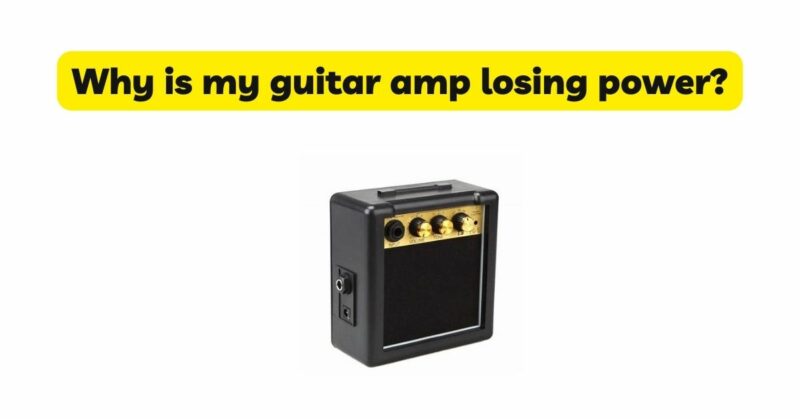A guitar amplifier is a vital component for guitarists, providing the necessary power and amplification to produce their desired tone. However, it can be frustrating when your guitar amp starts losing power, affecting the volume and overall performance. In this article, we will explore the possible reasons behind a guitar amp losing power and discuss various troubleshooting steps to identify and resolve the issue, allowing you to regain the full potential of your amp.
- Power Supply Issues: One of the most common causes of a guitar amp losing power is related to the power supply. Check the power cable and ensure it is properly connected to both the amp and the power outlet. Faulty power cables or loose connections can result in intermittent power loss or a reduction in overall power delivery. Additionally, try plugging the amp into a different power outlet to rule out any issues with the electrical circuit. Using a power conditioner or surge protector can also help filter out any electrical disturbances that may affect the amp’s power.
- Faulty Power Tubes/Valves: If you have a tube or valve amplifier, the power tubes or valves play a crucial role in amplifying the signal. Over time, these tubes can wear out or become faulty, leading to a loss of power. Inspect the power tubes/valves for any signs of damage, such as glowing elements or blackening. Replace any faulty tubes/valves with new ones to restore the amp’s power. Additionally, ensure that the tubes/valves are correctly biased, as improper biasing can also cause power loss.
- Speaker Problems: The speaker is another critical component in your guitar amp, responsible for converting electrical signals into audible sound. If the speaker is damaged or faulty, it can result in a loss of power and diminished volume. Inspect the speaker cone for tears, holes, or other visible damage. If damage is present, consider replacing the speaker or having it repaired by a professional. Loose or damaged speaker connections can also lead to power loss, so ensure the speaker cables are securely connected.
- Overheating: Excessive heat can cause various components in your guitar amp to malfunction, leading to power loss. Make sure your amp has proper ventilation and is not overheating during use. Check that the cooling fans are functioning correctly and are not blocked by dust or debris. If necessary, clean the cooling fans and ensure they are free from obstructions. Avoid placing the amp in confined spaces or near heat sources that can contribute to overheating.
- Faulty Components: Guitar amps consist of numerous electronic components that can deteriorate or fail over time. Faulty capacitors, resistors, or other internal components can result in a loss of power. Inspect the circuit board for any visible signs of damage, such as burnt or swollen components. While visually inspecting the components can provide some insight, it is recommended to consult a qualified technician for a thorough inspection and repair if you suspect internal component issues.
- Incorrect Impedance Matching: Impedance matching refers to the compatibility between your amp and the speakers or cabinets you are using. If the impedance is mismatched, it can cause a loss of power and potentially damage the amplifier. Ensure that the amp’s impedance setting matches the impedance of the speakers or cabinets. Consult the amp’s manual or the manufacturer’s specifications for the correct impedance settings and ensure proper matching.
- Environmental Factors: Environmental factors, such as room acoustics or electrical interference, can impact the power delivery of your guitar amp. Sound reflections, standing waves, or other acoustic properties of the room can affect the perceived power and overall sound quality. Consider adjusting the placement of your amp or using acoustic treatments to minimize these effects. Additionally, electrical interference from other devices or cables near the amp can introduce noise or power loss, so keep the amp away from potential sources of interference.
Conclusion: When your guitar amp starts losing power, it can be frustrating and hinder your ability to produce the desired sound. By understanding the potential causes behind this issue, such as power supply problems, faulty tubes/valves, speaker problems, overheating, faulty components, incorrect impedance matching, and environmental factors, you can effectively troubleshoot and resolve the problem. Regular maintenance, proper usage, and timely repairs can help ensure the optimal performance and power delivery of your guitar amp, allowing you to enjoy your playing experience to the fullest.

